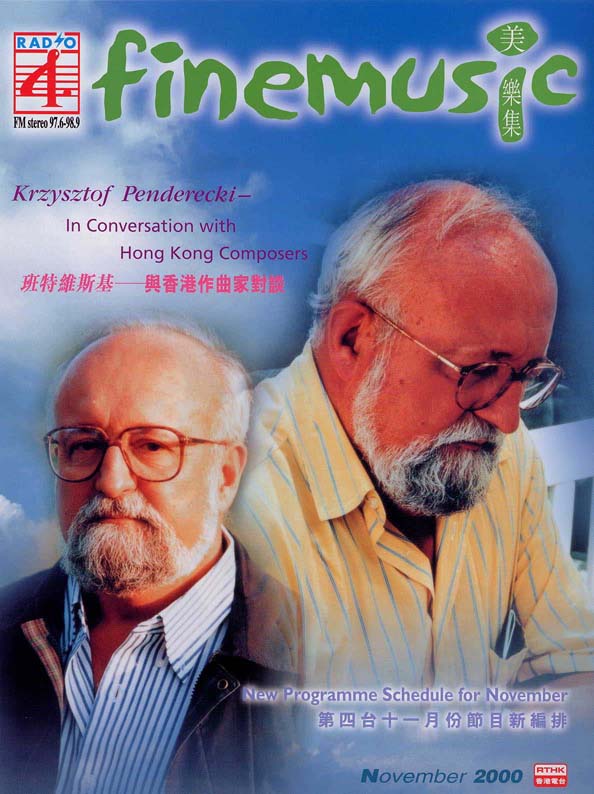Paradise Lost, Paradise Regained: The World and Music of Krzysztof Penderecki
The shrieks of Hell, the glories of Heaven; and all in-between, this is the sound world of contemporary composer Krzysztof Penderecki, who visits Hong Kong this November to conduct a program of his works with the Hong Kong Philharmonic Orchestra. In honour of this event, RTHK Radio 4 presents a workshop and a series of four programs introducing the music of this most influential and important Polish composer since Chopin.
Originally known for his uncompromising ultra-modern works featuring unusual effects and tone colours, Penderecki burst upon the musical scene at the age of 27 with his Threnody to the Victims of Hiroshima in 1960. Vividly depicting the cataclysmic horrors of man?s inhumanity, this death-song is one of the most frightening and gripping pieces of music ever written. While the radical techniques involved attracted the attention of the avant-garde, the music reaches all audiences because these techniques are used in the service of deeply held feelings and a profound, albeit unpleasant, moral message. Threnody established a musical and aesthetic path Penderecki followed for some time, with his oratorio Dies Irae dedicated to the memory of those murdered in Auschwitz, his incidental music to the radio play Brigade of Death, and other works.
The infernal is but a single aspect of the world, though, and the composer soon reached within his pervasive Catholic beliefs to seek the divine. The St. Luke Passion, perhaps his most famous work, greatly expanded Penderecki?s sonic world and set the stage for his future development as a highly eclectic composer. Rather than limiting himself to the technical possibilities of the avant-garde and the restricted expression thereby conceived, Penderecki opened himself to a wider world, incorporating Gregorian Chant, tertian triads, and even overt tonality. In 1973 Penderecki received a controversial commission from the Lyric Opera of Chicago for a work to be performed during America?s Bicentennial, which lead to the composition of his opera Paradise Lost. This huge work epitomizes Penderecki?s concerns. The fundamental conflicts of good against evil are played out in an emotional tableau encompassing the entirely of musical possibilities.
That this music of extremes comes from such a man should be no surprise. Penderecki?s formative years were spent during World War II. The Nazis executed 70% of those Poles in his father?s profession (law) and his family was evicted and lodged in a house whose former residents had been sent to the death camps. In spite of his wartime experiences he maintains a deep Christian belief in God. He came of age in communist Poland and became both sincerely patriotic and strongly opposed to the ideology of the government. Although a Soviet-bloc composer, his music was little known in the USSR; his reputation was earned primarily in Poland and the West. His interests range widely from antiques to philosophy, magic, and science fiction. While maintaining a lifetime residence in his home country, he is incredibly well traveled, often spending as much as ten months a year abroad. Speaking several languages fluently, he is a true citizen of the world?so much so that the United Nations recognized him by a commission for their silver jubilee.
Although Penderecki has become one of the most frequently performed of living composers, he has let neither his success nor his hectic schedule limit his pervading commitment to creation. He continues to compose works of the highest artistic and aesthetic quality, works that look piercingly into the human condition and find there worlds of compassion and pain, kingdoms of hatred, of fear, of love and forgiveness.
To Episode I: Music of Extremes Return to Music Criticism and Commentary